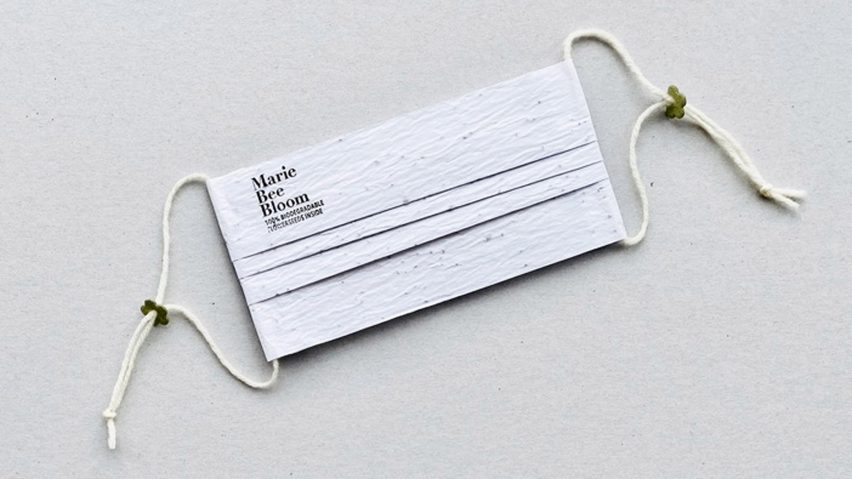From daisies to baby's breath, Dutch brand Marie Bee Bloom has embedded flower seeds into single-use rice paper masks in a bid to cut down on plastic pollution and give back to nature.
When planted into soil and watered, the seeds start to germinate in around three days and will ultimately grow into a small patch of wildflowers.
Fabricated in a small community workshop in the Netherlands, the mask itself will biodegrade whether placed in a garden or a landfill.
The designers created the product as an alternative to disposable personal protective equipment (PPE) made from plastics, which takes up to 450 years to biodegrade and breaks down into microplastics ingested by fish, other marine life and ultimately humans.
Rather than just mitigating this pollution, de Groot-Pons hopes to actively regenerate the natural environment by cultivating flowers beloved by bees and other pollinators.
"Marie Bee Bloom is about 'blooming the world', so the intention is really to plant the mask," the brand's founder Marianne de Groot-Pons told Dezeen. "Of course it decomposes but I don't want to encourage people to throw the masks away."
The seed mix contains seven different Dutch wildflowers, such as daisies, petunias, cornflowers and delicate baby's breath.
These seeds are fixed in place using a homemade adhesive of potato starch and water, wedged between two sheets of rice paper.
"I was already familiar with growth paper, a paper that contains seeds but is often thick and used for cards or invitations," said the designer. "The variant I was looking for had to be thin so that it could be folded and carried well, which I found in rice paper."
According to de Groot-Pons, the seeded paper offer as much protection as other homemade masks.
The logo printed on the outside is rendered in biodegradable ink, which she claims contains no harmful chemicals, while the ear loops are made from spun sheep's wool.
De Groot-Pons hopes to expand the brand internationally with seeds that are appropriate and beneficial to the various local ecosystems.
"Due to the seeds we use currently, we can only ship the Marie Bee Bloom masks in Europe," she explained.
"We are looking into how we can set up local productions in other countries and continents, of course using native seeds."
De Groot-Pons established the brand as a response to the rise in single-use plastic pollution due to the coronavirus pandemic, which saw an estimated 129 billion face masks used every month across the world in 2020.
She also hopes to offset her personal contribution to the issue as a virtue of being a graphic designer for almost a decade and working for consumer goods giant Unilever, which creates 70,000 tonnes of plastic pollution every year, covering more than 11 football pitches every day.
"In all the years that I have been working as a graphic designer, I have also polluted the earth with designing for print and packaging, so I wanted to give something back," she said.
"After weeks of tripping over all the blue disposable face masks on the street, I woke up one morning to the idea of a biodegradable mask with flower seeds in it – happy Earth, happy bees, happy nature, happy people."
Other attempts to mitigate the environmental impact of plastic PPE have seen designers turn discarded masks into stools and sofas, while Alice Potts combined food waste with flowers from London parks to create a series of bioplastic face shields.

